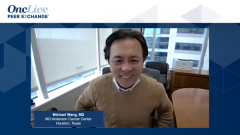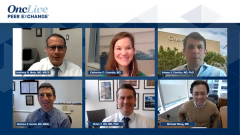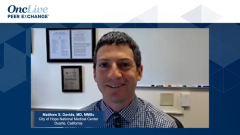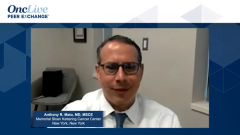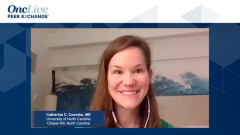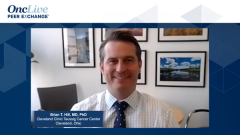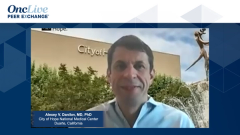
CAR T-Cell Therapy in R/R MCL
Michael Wang, MD, guides the panel in a discussion on CAR T-cell therapy for relapsed/refractory MCL including a summary of key takeaways from the ZUMA-2 trial and a conversation on real-world vs clinical trial data.
Episodes in this series

Anthony R. Mato, MD, MSCE: Michael, you have led the charge for the development of CAR (chimeric antigen receptor) T[-cell therapy] in the context of the ZUMA-2 trial (NCT02601313) for patients with mantle cell lymphoma (MCL). This was a huge deal a year ago at the most recent ASH (American Society of Hematology [Annual] Meeting [& Exposition]. Can you briefly summarize what the trial was, some takeaways, and most importantly, who should be getting CAR T[-cell therapy] and when?
Michael Wang, MD: [In] the clinical trial called the ZUMA-2 with KTE-X19 [brexucabtagene autoleucel], basically, it is a CD-19 therapy, a CAR T-cell therapy. It’s a phase 2 pivotal trial, [and] in 68 patients, the overall response rate was 93%; CI (confidence interval) is 67. At the [2022] ASCO (American Society of Clinical Oncology) [Annual Meeting], we presented 3-year follow-up data. After 3 years, 50% of patients were alive. To start with, this study population had 3 prior lines of therapy, mostly including BTK (Bruton tyrosine kinase) exposure, and 88% of these patients were refractory to BTK [inhibition]. Now, if you have a patient population with 3 prior lines, including a BTK inhibitor failure, the overall survival is less than 1 year. Now with this study, after 3 years, if 80% are still alive, this is really a life-saving therapy.
So who should be getting it? Patients [with] high-risk [disease should get it] if they relapse. After first-line relapse, they have P53, PI37 over 50, complex chromosome, and plateau of pleomorphic origin. They should receive, in my opinion, the KTE-X19 CAR T-[cell] therapy as early as possible. If the patient relapses 2 or 3 times, especially 3 times, please do the CAR T-cell [therapy] as soon as possible while the patient is still young and strong enough to withhold the toxicity of the CAR T-cell therapy. The toxicities are mainly CRS (cytokine release syndrome) and neurotoxicity. After all of this, [there was] no new mortality from neurotoxicity. Then there were several patients later [who] did not survive because of opportunistic infections. It's a very useful therapy when the patient has relapsed many times or has high-risk features.
Anthony R. Mato, MD, MSCE: Alexey, when you're thinking about somebody you treated in the frontline [setting] who's relapsing, is there anybody who should get CAR [T-cell therapy] before they get a BTK inhibitor?
Alexey V. Danilov, MD, PhD: Patients with high-risk blastoid MCL. I have been somewhat disappointed with BTK inhibitor efficacy in blastoid MCL. Although you can achieve some short-term responses, these responses are not typically durable. There are certainly patients where you could think of CAR T-cell [therapy] in [an] earlier line [of treatment], but the reality is, when somebody is progressing and requires treatment, they often do go to the BTK inhibitor prior to transitioning to CAR T[-cell therapy].
We have a study where we administer CAR T[-cell therapy] to patients who have not achieved complete response with MRD (minimal residual disease] in MCL on the BTK inhibitors acalabrutinib, zanubrutinib, or ibrutinib, so there's a consolidation strategy. Like I said, patients with high-risk disease, including blastoid MCL [and those with] TP53 abnormalities [may] be prime candidates for such a study.
Anthony R. Mato, MD, MSCE: Brian, Michael brought up the real-world data with the CAR T[-cell therapy], and one of the things that we're always grappling with is [whether] the data from the clinical trials [are] generalizable to the patients in our practice. That's a big issue, and the more intensive the therapy, the more we are concerned about that. For MCL, can you comment [on] the real-world studies? Are the data holding up as compared to what we saw in [the] ZUMA-2 [study]?
Brian T. Hill, MD, PhD: Great question. The observation frequently in oncology is that clinical trial data [are] better than what happens in general practice. The real world of CAR T[-cell therapy], or what we would say is the real referral center world, got together and collected data on a pretty large number of patients with MCL. [They] treated over 180 patients, which is double the size of the ZUMA-2 trial. These patients were treated at centers that are authorized CAR T-cell treatment centers, and interestingly, about 75% [to] 78% of the patients actually would not have been eligible for the ZUMA-2 study based on a number of different reasons, including number of prior lines of therapy and renal dysfunction. What was seen in this cohort was very impressive. [The] overall response rate was almost 90%, 70% complete remissions. Although follow-up is shorter than ZUMA-2, we can follow these patients now and see that it's likely they're going to derive similar benefit.
Michael Wang, MD: If I may I echo Dr. Hill's comment, there are 4 real-world studies: the one from Europe and another one from the Mayo Clinic, are seeing this using real-world data. There's another one led by one group, and then there’s another one using the database. Basically, the most advanced one would be the one from Mayo Clinic in Rochester. The response rate, like Brian said, is identical, so a majority of those people would not have been fitting to the criteria to enter the trial. That real-world data is holding up very well.
Transcript has been edited for clarity.


